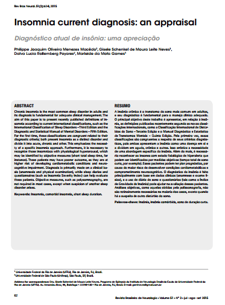 Insomnia has been typically considered a dysfunction of sleep regardless of other health
Insomnia has been typically considered a dysfunction of sleep regardless of other health
conditions.
However, it has recently been redefined to reflect the fact that it is normally related to other medical disorders.
While it can still be a stand-alone diagnosis, recent changes to the International Classification of Sleep Disorders - Third Edition (ICSD-3) have limited the definition, so it is more likely to be considered a symptom as opposed to a single primary diagnosis.
ICSD-3 Revisions
Recent changes to the previous definition of insomnia in 2013-14 have made a stand-alone diagnosis of chronic insomnia disorder, previously referred to as primary insomnia, less frequent.
The definition of insomnia as a primary diagnosis was scaled back with the publication of the ICSD-3 to more closely mirror definitions of insomnia in The Diagnostic and Statistical Manual of Mental Disorders - Fifth Edition (DSM-V).
The DSM-V classifies insomnia as trouble falling asleep or staying asleep, and any distinction between primary and secondary insomnia has been removed from the DSM-V.
The diagnoses for "sleep disorder related to another mental disorder" and "sleep disorder related to another medical condition" have also been eliminated and replaced with more specific diagnoses.
What is Insomnia?
There is a need to differentiate actual insomnia disorder from other medical problems which have insomnia as a symptom. Since the ICSD-3 has removed many of the diagnostic subtypes previously used, there has been confusion regarding the diagnosis of insomnia.
In a paper titled, Insomnia Current Diagnosis: An Appraisal in Revista Brasileira de Neurologia, the authors state that the
 “ICSD-3 includes three diagnostic categories for insomnia: chronic insomnia disorder, disorder of short-term insomnia and another insomnia disorder.
“ICSD-3 includes three diagnostic categories for insomnia: chronic insomnia disorder, disorder of short-term insomnia and another insomnia disorder.
"Chronic insomnia disorder is characterized by difficulty falling asleep and/or complaints of sleep maintenance associated with daytime impairment for at least three months.
"It is reserved for individuals whose sleep difficulties exceed frequency limits (at least three times per week) and minimum length to be associated with clinically significant morbidity.
"Of note, former chronic primary insomnia criteria (DSM-IV) included symptoms occurring for at least one month.
"Short-term insomnia has a similar definition and is applied when the complaints or symptoms last less than three months; when neither criterion is fulfilled, a definition of other insomnia disorder is used.”
Insomnia is a complex diagnosis that goes beyond the simple inability to fall asleep or stay asleep.
In a blog post for Sound Sleep Health [“What is Insomnia? (Types and Causes)”], the author states that “...[T]hese major changes to how medical professionals define and approach insomnia stresses the importance in recognizing that insomnia is usually related to some other medical disorder. While insomnia is neither strictly a dysfunction of sleep, nor is it solely a dysfunction of mental health.”
Insomnia is typically bi-directional, and co-morbidity is present in most cases. Therefore, it is difficult to distinguish whether insomnia is the cause of other disorders, or merely a symptom.
Disorders with Insomnia as a Symptom
There are many disorders in which insomnia can present as a symptom. In these instances, it is essential to treat both the disorder and the symptoms.
Depression: Both insomnia and obstructive sleep apnea (OSA) can be linked to depression. As with most diagnoses, sometimes the depression can be caused by sleep disturbances, while other times it can trigger them.
- Gastroesophageal Reflux Disease (GERD): Insomnia can be a symptom of GERD as well. This is usually due to the increased backflow of stomach acid into the esophagus while lying in the prone position, which causes awakenings.
- Hyperthyroidism: Hyperthyroidism, or overactive thyroid, can also result in insomnia. The excessive hormones released speed up many of the body’s processes, as well as elevating stress hormones. High cortisol levels in particular can lead to developing insomnia as a symptom.
Cancer: Sleep disturbances such as insomnia are frequent side effects of cancer. In an article in The Oncologist, the correlation between cancer and insomnia is discussed.
Speaking of cancer patients, the authors state, “On testing, they are frequently found to have low sleep efficiency (the ratio of time asleep to total time in bed).
Precipitating factors for insomnia in patients with cancer include the diagnosis of cancer, the type and stage of cancer, pain, side effects of treatment (e.g., nausea, vomiting, etc.), and/or the direct iatrogenic effects of treatment on sleep.”
- Diabetes: Diabetic neuropathy can lead to restless legs syndrome or pain. Both can result in delayed or disrupted sleep.
Asthma: An increase in airway resistance throughout the night can lead to increased coughing, wheezing, and breathlessness, which can disturb sleep.
Insomnia as Both Diagnosis and Symptom
Insomnia is a complex disorder. In many cases it is bidirectional and co-morbid, making it difficult to determine whether it is the underlying cause or merely a symptom.
Regardless of whether insomnia is the cause or a symptom, appropriate treatment of all related disorders is crucial in helping patients restore normal sleep patterns.
Understanding the recent changes in ICSD-3 definitions, in combination with the use of screening tools to identify chronic insomnia, will help healthcare providers in appropriately diagnosing and treating this sleep disorder.

